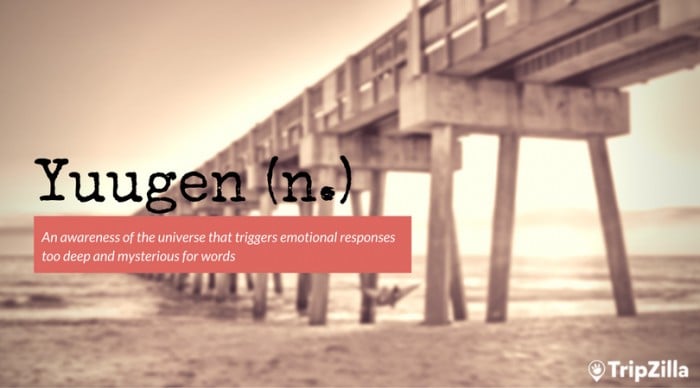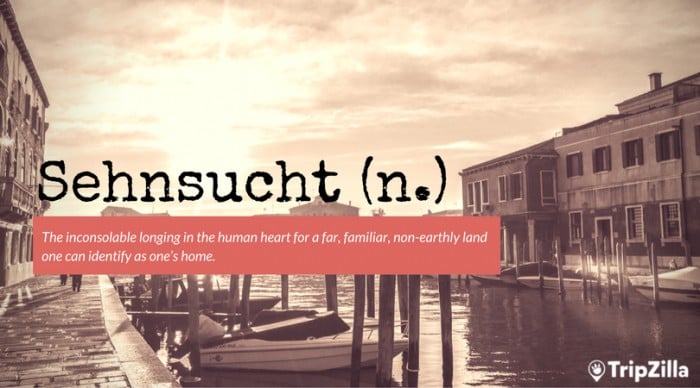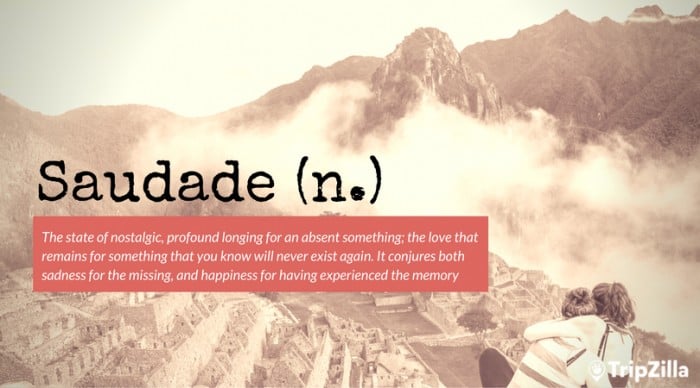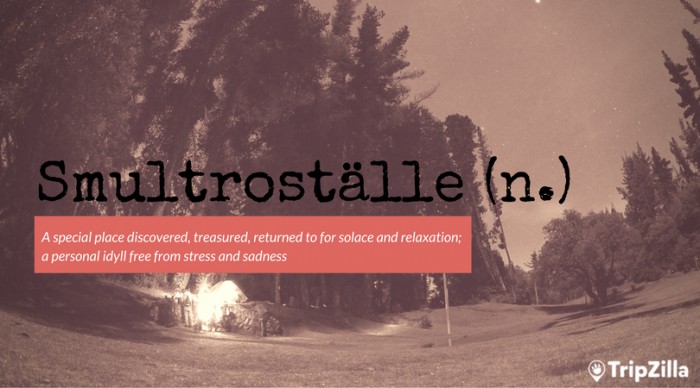Ibn Battuta, the renowned ethnographer and biographer, aptly described the transformative power of travel with his famous quote: “Traveling—it leaves you speechless, then turns you into a storyteller.”
Many of us have experienced the profound emotions that travel evokes. We stand in awe of breathtaking landscapes, our hearts filled with a sense of wonder and awe. Yet, sometimes words fail us, and we struggle to capture the depth of our experiences.
Also read: The Best Countries for Introverts Who Love to Travel
Have you ever felt this way? There are foreign words that can beautifully describe these indescribable emotions. As a frequent traveller, learning and appreciating these words can enrich your journeys and deepen your connection to the places you visit. Let’s explore some of these captivating words that can help you express your travel experiences!
1. Fernweh [FEIRN-veyh]
Origin: German

Fernweh is a German word that encapsulates a unique feeling of longing for distant places. It’s a combination of “fern” (far) and “weh” (woe or longing).
Fernweh goes beyond simple homesickness. It’s a yearning for adventures and experiences in unknown territories, a desire to explore the world and discover new cultures. It’s a feeling that many travellers can relate to, a deep-seated longing for the unfamiliar and the exciting.
2. Livsnjutare [lifs-nyoo-ta-reh]
Origin: Swedish

Livsnjutare is a Swedish word that translates to “enjoyer of life.” It describes someone who appreciates the simple pleasures of life, takes joy in everyday experiences, and lives life to the fullest.
This word captures the essence of a carefree and optimistic attitude towards life, embracing its ups and downs with a sense of gratitude and appreciation.
3. Resfeber [RACE-fay-ber]
Origin: Swedish

Resfeber is indeed a Swedish word that perfectly captures the feeling of pre-travel excitement and anticipation. It’s a combination of restlessness, anxiety, and a feverish desire to embark on a journey.
The word “resfeber” is a blend of “res” (meaning “travel” or “journey”) and “feber” (meaning “fever”). It perfectly encapsulates that mix of excitement and nervousness that many travellers experience before a trip.
4. Hygge [hU-ge]
Origin: Danish

Hygge is a Danish word that has gained global popularity in recent years. It describes a feeling of cosiness, contentment, and well-being. It’s often associated with simple pleasures like spending time with loved ones, enjoying a warm cup of tea, or reading a good book in a comfortable setting.
Hygge embodies a sense of contentment and appreciation for the little things in life. It’s a concept that promotes mindfulness, gratitude, and a focus on creating a warm and inviting atmosphere.
5. Nefelibata [ne-fe-LE-ba-ta]
Origin: Greek

Nefelibata comes from the words “nephele” (meaning cloud) and “batein” (meaning to walk). So, a nefelibata is literally someone who walks on clouds.
The term is often used to describe a dreamy, imaginative, or absent-minded person who seems to be floating above the ground, lost in their thoughts. It’s a poetic word that evokes a sense of wonder and detachment from the everyday world.
6. Numinous [noo-muh-nuh s, nyoo-]
Origin: English

This word describes something that is awe-inspiring, mysterious, or spiritually significant. It often evokes a sense of wonder, reverence, or transcendence.
For example, a majestic mountain vista, a breathtaking sunset, or a profound spiritual experience can all be described as numinous. The word implies a sense of something beyond the ordinary, something that touches the soul.
7. Rasasvada [ra-sas-va-da]
Origin: Sanskrit

Rasasvada translates to “the tasting of flavour” or “the enjoyment of taste.” In a broader sense, it signifies the appreciation of sensory pleasures and the enjoyment of life’s experiences.
Rasasvada is closely connected to the concept of rasa, which refers to the different emotions or tastes that can be experienced in life. These include joy, sorrow, anger, fear, love, and wonder. By savouring and appreciating these different rasas, one can fully experience the richness and complexity of life.
Also read: 11 Easiest Countries to Immigrate to for Better Opportunities
8. Coddiwomple [koh-dee-hwom-puh l]
Origin: English

Coddiwomple is a whimsical English word that means to travel aimlessly or without a specific destination. It implies a sense of adventure, spontaneity, and a willingness to let the journey guide you.
The word was coined by Lewis Carroll, the author of Alice’s Adventures in Wonderland. It’s a playful and imaginative term that perfectly captures the spirit of exploration and discovery.
9. Yuugen/Yūgen [yoo-gen]
Origin: Japanese

Yūgen is a complex aesthetic concept that can be difficult to translate directly into English. However, it generally refers to a profound and mysterious sense of beauty, often associated with simplicity, subtlety, and a sense of the infinite.
Yūgen often involves a feeling of awe, wonder, and a sense of something greater than oneself. It’s a concept that is deeply rooted in Japanese culture and philosophy, and it’s often expressed through art, literature, and nature.
10. Eleutheromania [el-U-ther-O-mAn-Ea]
Origin: Greek

Coming from the words “eleutheros” (meaning free) and “mania” (meaning madness or intense passion), eleutheromania literally translates to “the madness of freedom.”
The term describes a strong desire or craving for freedom, often to the point of obsession or recklessness. It can refer to a longing for political freedom, personal independence, or liberation from any form of constraint or restriction.
11. Eudaimonia [yoo-di-moh-nee-uh]
Origin: Greek

Eudaimonia is a complex concept that translates roughly to “human flourishing” or “happiness.” However, it goes beyond mere pleasure or contentment. Eudaimonia encompasses living a meaningful and fulfilling life, pursuing virtue, and realizing one’s full potential.
In ancient Greek philosophy, eudaimonia was considered the ultimate goal of human existence. It involves living by reason and virtue and cultivating a sense of well-being and purpose.
12. Novaturient [nO-va-tUr-E-ent]
Origin: Latin

Coming from the words “novatus” (meaning new) and “turiens” (meaning eager or desirous), novaturient literally translates to “eager for new things.”
The word describes a person who has a strong desire for novelty, adventure, and change. It’s often used to describe someone who is curious, adventurous, and always seeking new experiences.
Also read: How Backpacking Will Change Your Life
13. Sehnsucht [ZEN-zookt]
Origin: German

14. Saudade [soh-dah-duh]
Origin: Portuguese

Saudade is a Portuguese word that has gained widespread recognition for its ability to capture a complex and nuanced emotion. While it doesn’t have a direct English equivalent, it can be roughly translated as a bittersweet longing or nostalgia.
Saudade often implies a sense of melancholic yearning for something or someone that is absent. It can be a longing for a lost love, a missed opportunity, a distant place, or even a simpler time. The feeling is often accompanied by a sense of tenderness, melancholy, and a touch of hope.
15. Sturmfrei [SHTOORM-fry]
Origin: German

Sturmfrei literally translates to “storm-free,” but it has a more figurative meaning. Sturmfrei refers to a state of freedom from obligations or restrictions, a time of relaxation and enjoyment. It’s often used to describe a period when children are excused from school or when adults are free from work responsibilities.
So, while the literal meaning is “storm-free,” Sturmfrei evokes a sense of calm, peace, and the freedom to do as one pleases.
16. Smultroställe [smUl-tron-stel-e]
Origin: Swedish

The Swedish word Smultroställe holds a special meaning beyond its literal translation of “cloudberry stall.” It signifies a place that is deeply cherished and yearned for, a place that evokes a sense of nostalgia and longing.
For many Swedes, a “Smultroställe” might be a childhood home, a beloved vacation spot, or a serene natural setting. It’s a place that holds personal significance and evokes a sense of comfort, peace, and belonging.
17. Selcouth [sel-kooth]
Origin: English

Selcouth is an English word, though it’s not very common in modern usage. It comes from the Middle English word “slecuth,” which means “rare,” “unusual,” or “wonderful.”
The word has a slightly archaic feel to it, but it’s still used to describe something that is extraordinary, fascinating, or out of the ordinary. It conveys a sense of wonder, curiosity, and delight.
18. Hodophile [hoh-duh-fahyl]
Origin: Greek

Hodophile comes from the words “hodos” (meaning way or journey) and “phile” (meaning lover). So, a hodophile is literally a “lover of journeys.”
The term describes someone who has a passion for travelling and exploring new places. It’s a word that captures the spirit of adventure and the desire to see the world.
19. Strikhedonia [strik-he-don-ea]
Origin: Greek

20. Sonder [son-der]
Origin: American

Sonder is a relatively new word coined by American author John Koenig in 2012 for his online project, The Dictionary of Obscure Sorrows. It’s inspired by the German word “sonder-” which means “separate” or “special.”
Koenig defines “sonder” as: “The realization that each random passerby is living a life as vivid and complex as your own—with their own ambitions, dreams, fears, and insecurities—and that you are just one of countless strangers in their story, as they are just one of countless strangers in yours.”
It’s a poignant word that captures the fleeting nature of human connection and the realization of our shared humanity.
Also read: Extroverts, Here’s What You Can Learn From Introverted Travellers
Did those beautiful words just inspire you to start fulfilling your travel dreams? Learning these words can add a touch of sophistication to your vocabulary and help you better express your travel experiences. It might even inspire you to plan your next adventure!




